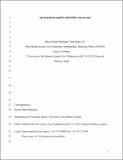Files in this item
Age-dependent cognitive inflexibility in great apes
Item metadata
| dc.contributor.author | Marin Manrique, Hector | |
| dc.contributor.author | Call, Josep | |
| dc.date.accessioned | 2016-02-03T00:12:10Z | |
| dc.date.available | 2016-02-03T00:12:10Z | |
| dc.date.issued | 2015-04 | |
| dc.identifier | 240324932 | |
| dc.identifier | 68acdc32-c14c-4de1-8b84-9a3167a05fd0 | |
| dc.identifier | 000351058700001 | |
| dc.identifier | 84961290230 | |
| dc.identifier.citation | Marin Manrique , H & Call , J 2015 , ' Age-dependent cognitive inflexibility in great apes ' , Animal Behaviour , vol. 102 , pp. 1-6 . https://doi.org/10.1016/j.anbehav.2015.01.002 | en |
| dc.identifier.issn | 0003-3472 | |
| dc.identifier.other | ORCID: /0000-0002-8597-8336/work/37477803 | |
| dc.identifier.uri | https://hdl.handle.net/10023/8122 | |
| dc.description.abstract | The ability to suppress and/or change behaviour on the basis of negative feedback, often conceptualized as cognitive flexibility, has rarely been investigated in nonhuman great apes across a broad age range. In this study, 25 chimpanzees, Pan troglodytes, eight bonobos, Pan paniscus, seven orang-utans, Pongo abelii, and three gorillas, Gorilla gorilla, whose ages ranged from 5 to 48 years, were presented with a transparent Plexiglas rectangular box horizontally attached to their cage mesh. A square container, 7.5 cm2, fixed inside the apparatus contained a food reward (i.e. a grape). While the container rested on its central position the grape was not accessible. To retrieve the grape the subjects needed to grasp the handle connected to the reward container and displace it sideways to reach one of the lateral access windows. Subjects were intensively trained to displace the handle to a specific side (right or left, depending on the group) and then the rewarded side was reversed during the test. Performance in this reversal task did not differ significantly between species. However, a U-shaped relation between age and perseverative responding (i.e. moves to the previously rewarded side) was observed, extending findings with humans to our closest living primate relatives. (C) 2015 The Association for the Study of Animal Behaviour. Published by Elsevier Ltd. All rights reserved. | |
| dc.format.extent | 6 | |
| dc.format.extent | 382776 | |
| dc.language.iso | eng | |
| dc.relation.ispartof | Animal Behaviour | en |
| dc.subject | Ageing | en |
| dc.subject | Cognitive flexibility | en |
| dc.subject | Great apes | en |
| dc.subject | Perseverative responding | en |
| dc.subject | Reversal task | en |
| dc.subject | RC0321 Neuroscience. Biological psychiatry. Neuropsychiatry | en |
| dc.subject | BF Psychology | en |
| dc.subject | QL Zoology | en |
| dc.subject | NDAS | en |
| dc.subject.lcc | RC0321 | en |
| dc.subject.lcc | BF | en |
| dc.subject.lcc | QL | en |
| dc.title | Age-dependent cognitive inflexibility in great apes | en |
| dc.type | Journal article | en |
| dc.contributor.institution | University of St Andrews. School of Psychology and Neuroscience | en |
| dc.contributor.institution | University of St Andrews. Centre for Social Learning & Cognitive Evolution | en |
| dc.identifier.doi | https://doi.org/10.1016/j.anbehav.2015.01.002 | |
| dc.description.status | Peer reviewed | en |
| dc.date.embargoedUntil | 2016-02-03 |
This item appears in the following Collection(s)
Items in the St Andrews Research Repository are protected by copyright, with all rights reserved, unless otherwise indicated.

